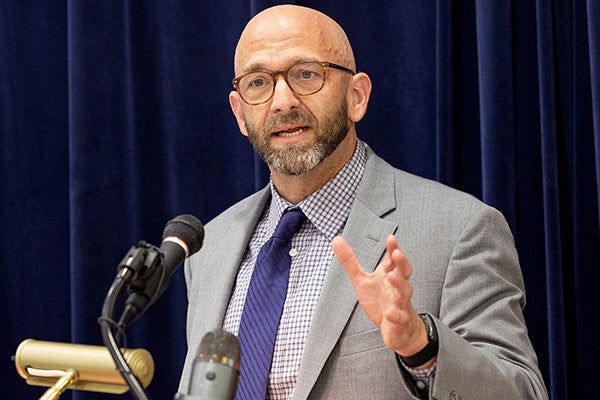RURAL EXPANSION
ECU, USDA announce grant expanding rural business development program
A $150,000 grant from the United States Department of Agriculture will expand East Carolina University’s reach to businesses across the state.
Launched in September 2020, the College of Business Crisp Small Business Resource Center’s Accelerate Rural NC program focuses on helping small businesses in rural regions gain access to global markets with innovative products.
Funding from the USDA’s business entrepreneurship grant program will allow Accelerate Rural NC to move its program into a hybrid online and community-based format, increasing the program’s reach from ECU’s 29-county service area to a statewide audience.
Justin Maxson, USDA deputy under secretary for rural development, said that ECU has a pivotal role in economic development and regional transformation in the state.

Justin Maxson, U.S. Department of Agriculture deputy under secretary for rural development, speaks during the USDA grant announcement.
“ECU is exactly the sort of institution that this (USDA) administration wants to develop real partnerships with and through,” Maxson said. “What ECU brings is a focus on these 29 counties in a way that’s transformational. I believe deeply in rural entrepreneurs and believe they are a critical part of the economy and the future of this place.”
U.S. Rep. G.K. Butterfield, whose district covers 15 counties including ECU, said that he’s lending support for infrastructure projects — like increasing access to broadband internet — that will impact rural entrepreneurs.
“We advocate strongly for more investment in rural development,” Butterfield said. “We’re beginning to see some results for our efforts. The future is very promising.”
Ninety-three small businesses participated in Accelerate Rural NC during its first year. The program created an average of 1.8 new jobs per company with early-stage companies reporting $500,000 in raised capital.
Accelerate Rural NC director Dennis Tracz said the early success of the program came from its willingness to invest in eastern North Carolina, but not limit itself to the region.
“Buying local is great,” Tracz said. “We’re all in favor of that. But for small rural communities, your customer base is too small to just rely on that.
“We showed companies how to have regional, national and even international customer bases through digital platforms … we provide them the guidance and resources to take advantage of these platforms when they’re ready.”
Tracz added that in the future, Accelerate Rural NC will focus on e-commerce development for regional businesses and how they interact with their customers online. He said that the program is developing livestreaming e-commerce shows focused on “shopatainment” that feature eastern North Carolina’s authentic products and people.
“This new and unique marketplace approach can provide for fast growth, increased employment and potential for significant impact which will in turn boost our rural areas economically,” he said.
Keeping that authenticity is important for both ECU and the businesses it serves, said Crisp Small Business Resource Center director David Mayo.
“When people think of rural development, they think, ‘How can we take the rural environment and turn it into an urban environment?’” Mayo said. “That’s not what we want. We want to be prosperous in our rural areas — have high wages and a high quality of life — and remain true to our roots.”
Mayo believes Accelerate Rural NC will achieve that by taking best practices that have worked in other regions and bringing them to rural North Carolina.
“Our vision has always been about figuring out how we make the biggest impact with Accelerate Rural NC,” Mayo said. “How can we take this tremendous impact and scale it? With this commitment from the USDA, we’ll be able to do that.”
Accelerate Rural NC’s next cohort will begin this fall. Businesses interested in participating in the future are encouraged to apply online.
Accelerate Rural NC is part of ECU’s larger entrepreneurship ecosystem, including the Miller School of Entrepreneurship, RISE29 and the university’s E-Passport program.
